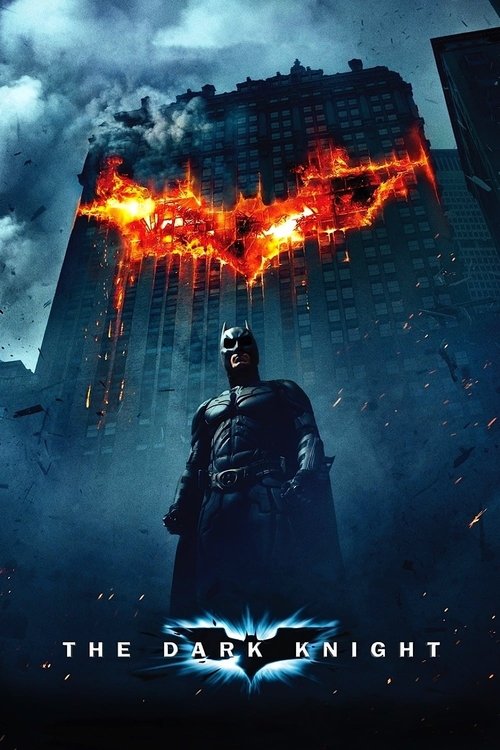The Dark Knight

Plot
The Dark Knight, Christopher Nolan's 2008 masterpiece, is an intense, thought-provoking sequel to Batman Begins. The film delves deeper into the complexities of its characters, pushing the limits of action, suspense, and emotional depth. After the events of Batman Begins, Bruce Wayne (Christian Bale) has become a legendary figure in the underworld, feared and respected by both villains and civilians alike. His partnership with Lieutenant James Gordon (Gary Oldman) and District Attorney Harvey Dent (Aaron Eckhart) proves to be a vital component in the war against crime. Initially, the situation appears to be turning in their favor. The Riddler, the new villain of Gotham, has been apprehended by Batman, and the streets begin to calm down. However, the calm is short-lived, as at the same time, a second and far more enigmatic figure emerges from the shadows: the Joker (Heath Ledger). The Clown Prince of Crime is a force of chaos, driven by a twisted sense of anarchic reason, and his unpredictability puts everyone in Gotham on high alert. The Joker, clad in his signature face paint and grinning maniacally, introduces himself to the citizens of Gotham with a brutal efficiency. He orchestrates a series of seemingly unrelated violent crimes, targeting anyone, regardless of their social standing, who stands in his way. This erratic and merciless behavior prompts Batman and his allies to re-strategize their approach. Meanwhile, the relationship between Bruce Wayne and Rachel Dawes (Maggie Gyllenhaal), a former love interest, becomes strained. Their love, complicated by Bruce's dedication to the Batman persona and his lingering feelings of guilt and inadequacy, appears to be unraveling. This internal turmoil makes the emotionally charged scenes more visceral and authentic, deepening the understanding of Bruce's transformative journey into his alter ego. As chaos grips Gotham, Batman finds himself in a battle of wits with the Joker, with the district attorney, Harvey Dent, serving as a crucial mediator in the process. The district attorney's unwavering optimism and desire for justice are put to the test as the Joker pushes him to the breaking point. This delicate dynamic underscores the themes of chaos theory and moral compromise in the face of brutality. One of the most unsettling aspects of the Joker's performance involves his unsentimental, uncouth nature. The actor Heath Ledger poured every ounce of his being into the portrayal, tapping into the fear that defined his performance, cementing his status as a top-tier performer even in his final cinematic release. Nolan works within the established mythos of the Batman universe while simultaneously introducing gripping allegorical moments and memorable supporting characters. The intensity builds throughout the film as more seemingly disparate events shed light on a far larger scheme orchestrated by the Joker. Batman and the Joker engage in an adrenaline-fueled battle that transcends the fundamental distinction between hero and villain. A series of events leaves the Caped Crusader at odds with his responsibility towards Harvey Dent and the pursuit of justice. Batman's moral stakes are forever altered by the implications of the tragic fall of his last remaining redeeming hope, Harvey Dent. In the climactic finale of the film, the residents of Gotham must come together to prevent the full-blown collapse of their order. Although battered, the Batman's selfless protection of innocent individuals and defiance of Joker's every maladaption act as a testament to his endearing commitment to his identity. Ultimately, the film raises essential questions about accountability and consequences of justice amidst unrelenting chaos and moral ambiguity. The Joker and Batman embody two fundamental approaches to chaos and order – either to master and control, or to surrender and allow it to define one's own existence.
Reviews
Ivan
Didn't see what all the hype was about...
Penelope
One of the most profound blockbusters ever made. Whether it's the unsettling resonance of the Joker's anarchistic nihilism secretly simmering within people's hearts, or the sympathetic understanding for Batman's lonely vigil in the dark, it all stems from a release of disillusionment with the world. The Joker is right in a way – he and Batman are kindred spirits, both outcasts. But Batman internalizes the pain, stubbornly clinging to a flickering hope, while the Joker unleashes his pain upon the world.
Karen
With Batman, Two-Face, and the Joker embodying the inherent conflict and choices between good and evil within humanity, the film achieves the status of the best comic book and superhero movie ever made. Mtime: "Nolan renders the dichotomy between art house and commercial cinema irrelevant. *The Dark Knight* not only captures the essence of a classical tragedy but also delves into contemporary American issues such as terrorism and the abuse of power. Crucially, the film is flawlessly entertaining."
Rowan
Nolan's Batman elevated the superhero genre to an entirely new level. It's not even in the same league as other comic book films.
Quinn
The universal acclaim is well-deserved. Seeing is believing. Who knew a comic book superhero saga could stretch to the sixth installment, practically driving screenwriters to the brink? But what emerged with *The Dark Knight* transcends its source material, reaching a tragic and mesmerizing level – a true miracle. The script is undeniably brilliant, the direction outstanding, and the acting simply leaves you speechless; it's just freaking stunning.
Recommendations




